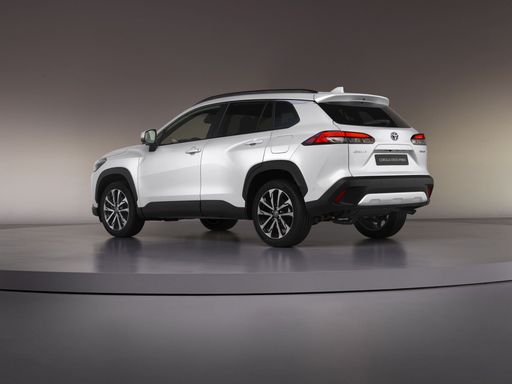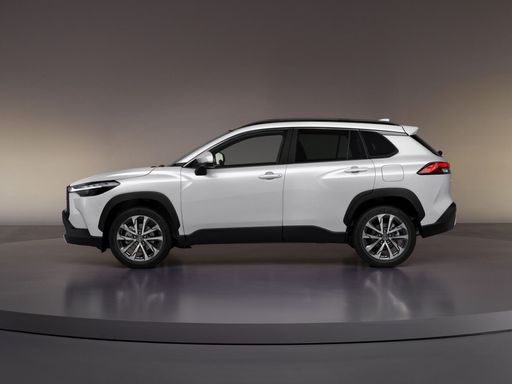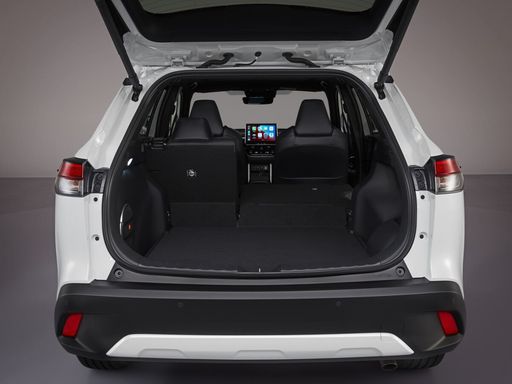Hyundai Tucson vs Toyota Corolla Cross - Differences and prices compared
Compare performance (288 HP vs 180 HP), boot space and price (20900 £ vs 31700 £ ) at a glance. Find out which car is the better choice for you – Hyundai Tucson or Toyota Corolla Cross?
Costs and Efficiency:
Price and efficiency are often the first things buyers look at. Here it becomes clear which model has the long-term edge – whether at the pump, the plug, or in purchase price.
Hyundai Tucson has a clearly advantage in terms of price – it starts at 20900 £ , while the Toyota Corolla Cross costs 31700 £ . That’s a price difference of around 10808 £.
Fuel consumption also shows a difference: Hyundai Tucson manages with 2.70 L and is therefore convincingly more efficient than the Toyota Corolla Cross with 4.90 L. The difference is about 2.20 L per 100 km.
Engine and Performance:
Power, torque and acceleration say a lot about how a car feels on the road. This is where you see which model delivers more driving dynamics.
When it comes to engine power, the Hyundai Tucson has a evident edge – offering 288 HP compared to 180 HP. That’s roughly 108 HP more horsepower.
In acceleration from 0 to 100 km/h, the Hyundai Tucson is barely noticeable quicker – completing the sprint in 7.50 s, while the Toyota Corolla Cross takes 7.60 s. That’s about 0.10 s faster.
In terms of top speed, the Hyundai Tucson performs to a small extent better – reaching 204 km/h, while the Toyota Corolla Cross tops out at 180 km/h. The difference is around 24 km/h.
Space and Everyday Use:
Beyond pure performance, interior space and usability matter most in daily life. This is where you see which car is more practical and versatile.
Both vehicles offer seating for 5 people.
In curb weight, Toyota Corolla Cross is slightly lighter – 1380 kg compared to 1542 kg. The difference is around 162 kg.
In terms of boot space, the Hyundai Tucson offers noticeable more room – 620 L compared to 425 L. That’s a difference of about 195 L.
In maximum load capacity, the Hyundai Tucson performs noticeable better – up to 1799 L, which is about 462 L more than the Toyota Corolla Cross.
When it comes to payload, Toyota Corolla Cross slight takes the win – 560 kg compared to 545 kg. That’s a difference of about 15 kg.
Who wins the race in the data check?
The Hyundai Tucson is decisively ahead in the objective data comparison.
This result only shows which model scores more points on paper – not which of the two cars feels right for you.
Costs and Consumption
View detailed analysis
Engine and Performance
View detailed analysis
Dimensions and Body
View detailed analysis

Hyundai Tucson
Hyundai Tucson
Hyundai Tucson marries bold, sculpted looks with a clever, roomy cabin that feels smarter than its price tag suggests. It's composed on the road, easy to live with day-to-day, and a sensible choice for buyers who want SUV style without the showroom theatrics.
details




Toyota Corolla Cross
The Toyota Corolla Cross takes the familiar Corolla recipe, lifts it up and dresses it in SUV clothes — sensible, comfortable and blessedly unflashy. It won’t thrill the enthusiast, but its easy manners, clever packaging and dependable feel make it an ideal everyday car for shoppers who prefer sense over sass.
details




Costs and Consumption |
|
|---|---|
|
Price
20900 - 47900 £
|
Price
31700 - 41900 £
|
|
Consumption L/100km
2.7 - 7.6 L
|
Consumption L/100km
4.9 - 5.3 L
|
|
Consumption kWh/100km
-
|
Consumption kWh/100km
-
|
|
Electric Range
63 - 70 km
|
Electric Range
-
|
|
Battery Capacity
-
|
Battery Capacity
-
|
|
co2
62 - 172 g/km
|
co2
112 - 120 g/km
|
|
Fuel tank capacity
52 - 54 L
|
Fuel tank capacity
36 - 43 L
|
Dimensions and Body |
|
|---|---|
|
Body Type
SUV
|
Body Type
SUV
|
|
Seats
5
|
Seats
5
|
|
Doors
5
|
Doors
5
|
|
Curb weight
1542 - 1893 kg
|
Curb weight
1380 - 1500 kg
|
|
Trunk capacity
546 - 620 L
|
Trunk capacity
414 - 425 L
|
|
Length
4525 - 4535 mm
|
Length
4460 mm
|
|
Width
1865 mm
|
Width
1825 mm
|
|
Height
1650 mm
|
Height
1620 mm
|
|
Max trunk capacity
1795 - 1799 L
|
Max trunk capacity
1333 - 1337 L
|
|
Payload
518 - 545 kg
|
Payload
515 - 560 kg
|
Engine and Performance |
|
|---|---|
|
Engine Type
Petrol, Full Hybrid, Plugin Hybrid, Diesel MHEV
|
Engine Type
Full Hybrid
|
|
Transmission
Manuel, Automatic
|
Transmission
Automatic
|
|
Transmission Detail
Manual Gearbox, Dual-Clutch Automatic, Automatic Gearbox
|
Transmission Detail
CVT
|
|
Drive Type
Front-Wheel Drive, All-Wheel Drive
|
Drive Type
Front-Wheel Drive, All-Wheel Drive
|
|
Power HP
136 - 288 HP
|
Power HP
140 - 180 HP
|
|
Acceleration 0-100km/h
7.5 - 11.6 s
|
Acceleration 0-100km/h
7.6 - 10 s
|
|
Max Speed
196 - 204 km/h
|
Max Speed
170 - 180 km/h
|
|
Torque
250 - 379 Nm
|
Torque
-
|
|
Number of Cylinders
4
|
Number of Cylinders
4
|
|
Power kW
100 - 212 kW
|
Power kW
103 - 132 kW
|
|
Engine capacity
1598 cm3
|
Engine capacity
1798 - 1987 cm3
|
General |
|
|---|---|
|
Model Year
2025
|
Model Year
2025
|
|
CO2 Efficiency Class
F, D, E, B
|
CO2 Efficiency Class
C, D
|
|
Brand
Hyundai
|
Brand
Toyota
|
What drive types are available for the Hyundai Tucson?
Available configurations include Front-Wheel Drive or All-Wheel Drive.




